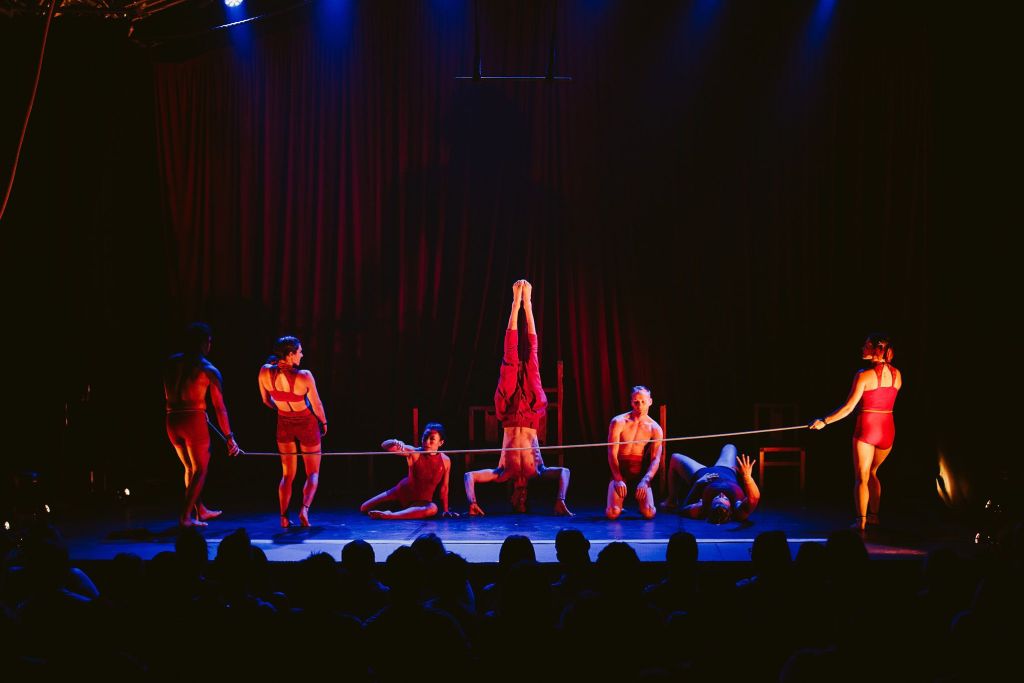Review from: Assembly George Square Gardens, Edinburgh Festival Fringe; 3rd August 2019
With their largest ensemble yet, Casus return again to the Fringe to bathe us in their flowing acrobatics and aerial choreographies. Rich as ever in evocative music choices and unique physical entanglements, DNA is also – to my mind – their strongest blend of movement with meaning.
It takes a while to filter through, but once the individual troupe members begin to take solo spots from out of the crowd, then a theme starts to emerge of hidden personal truths. Truths about what goes on when the dominant society expects certain types of behaviour or presentation that we may not be born to conform to. Some truths that I recognise personally, and other truths from other lives.
Costumes are detailed and personal beyond the uniform red colour. Lace, sparkle, satin textures, fringe and velour personalise the training shorts and tops and, over the course of the show, personalities are revealed too, behind the functional performance bodies we begin with.
As the show opens, a whimsical piano track is true to brand, as are the intricate interchanges of acrobatic figures about the Spiegeltent’s small central stage. The skills that are new to me seem like inevitable progression of the company’s work more than pure innovation, as the walk-across becomes a cartwheel-across, and more performers means more combinations of possible towers. The smallest bases and the largest fliers. Women support others on their heads. Men tenderly touch hands.

The performing company is co-founders Jesse Scott and Lachlan McAuley, with Phoebe Carlson, Sarah McDougall, Mayu Muto, Kali Rettalack and Johnny Brown, and the show has been directed by Scott and Natano Fa’anana (who also co-founded the company, along with Emma Serjeant, in 2011).
McDougall attempts to manœuvre around her aerial chains in piled-on feminine encumberments of fancy frock, frilly knickers and fierce high heels. Brown’s cultural rituals are corrupted by veiled phantoms instructing him in their religion. Scott has to contend with a deluge of women thrown at him, hanging from him, before finding eventual solace with real-life husband McAuley. Rettalack seems to have demons of mental health problems to make peace with.
When I started writing circus reviews in 2013, I would have had to say the Casus show ‘is not about the tricks, it’s about a cumulative effect’. Now I take that for granted, but that’s because I’m lucky enough to see a great variety of different circus types, and recognise this particular style. Don’t let that kid you that the tricks aren’t extraordinary mind. They are just the medium rather than the focus in a bigger moving picture.
The only other props are seven wooden seats – ripe for stacking or a clambered game of musical chairs – and a couple of lengths of rope. In several ways, this show feels like it could be an antipodean sequel to Barely Methodical Troupe’s Shift, and it’s no surprise to read back Vendetta Vain’s review from last year and see her draw a Casus connection to the BMT project – beyond the physical echoes, there is the vital sense of camaraderie. DNA delivers us to a place of acceptance and love that’s palpable. We’re not left with an unequivocal happy ending, because that’s not life, but I come out feeling hope, togetherness, and a sense of gratitude that humankind has enough variety in it to allow these amazing skills to be developed and shared.




